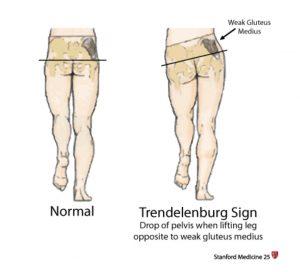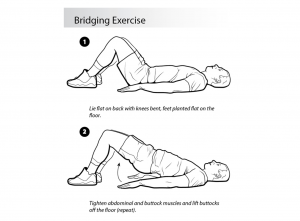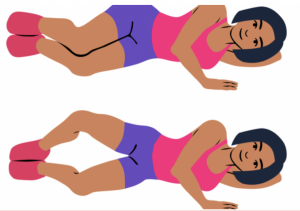A Muscular Perspective
Is your lower back unhappy from lack of motion and an abundance of sitting during Shelter-in-Place? Wonder why your back hurts so much when you don’t move?
 The problem lies not in the weakness of your lower back muscles, but of your deep gluteal muscles!
The problem lies not in the weakness of your lower back muscles, but of your deep gluteal muscles!
These muscles, the gluteus medius in particular, help stabilize your pelvis. When you walk, they keep your hips level and even.
But sit for an extended period and the gluteus medius muscle turns off. So when you finally stand and move around, your pelvis is unstable. Can this affect your lower back?
Oh yes. Because a weak or incorrectly firing gluteus medius makes your hips sway from side to side like the girl from Ipanema. This motion can strain your lower back muscles in two ways.
The gluteus medius’ main job is to stabilize the pelvis. When the muscles aren’t able to perform, your lower back muscles get  recruited to help and maybe strained by the hip-swaying.
recruited to help and maybe strained by the hip-swaying.
How can you turn your gluteus medius back on so that you don’t injure yourself when you do move?
Acupuncture needles placed gluteus medius tissue help turn this muscle group back on. I sometimes add a light electronic stimulation to the needles to artificially contract and relax the gluteus medius and get it firing. If you have back pain, I am now open and can help you in person! Book your appointment right now.
 You can also incorporate movements that specifically activate the gluteus, like bridging, medius muscle into your breaks.
You can also incorporate movements that specifically activate the gluteus, like bridging, medius muscle into your breaks.
Clamshells are another good activity to incorporate into your daily routine to activate the gluteus medium.
This is especially good practice if you’ve always routinely worked long hours at a desk. Do it now and help prevent injuries later, as well, especially if you like to go workout after a long day at work.
A Chinese Medicine Perspective on Inactivity
Do your lower back and neck hurt when you haven’t been moving much? Do you find yourself irritable, cranky, or exhausted at the end of the day?
In Chinese medicine, as in Western medicine, circulation is the key to good health. When you don’t move for prolonged periods of time, your circulation becomes impaired.
One of the pathologies only Chinese medicine describes is impaired circulation as qi stagnation. Symptoms can include body pain, irritability, a quick temper, depression, constipation and/or diarrhea, rib side discomfort, chronically cold hands, breast tenderness and PMS.
Aside from acupuncture and herbs, one of the best things you can do to alleviate liver qi stagnation is to move.
Movement doesn’t necessarily mean exercise, though exercise is great for liver qi stagnation and I recommend that too!
If you’re working from home, get up and walk around between Zoom meetings. If you’re working on a project, set your timer on your phone every half hour or so.
Tired of pacing around your apartment and need some inspiration? Follow along with this video of my doing four basic tai qi moves. The Snake Creeps Down is a favorite of those with lower back pain!
